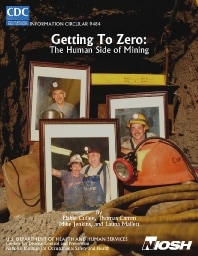Mining Publication: Getting to Zero ... The Human Side of Mining
Original creation date: March 2006
Authors: ET Cullen, TW Camm, FM Jenkins, LG Mallett
NIOSHTIC2 Number: 20029051
U.S. Department of Health and Human Services, Centers for Disease Control and Prevention, National Institute for Occupational Safety and Health, Spokane Research Laboratory, Spokane, WA, DHHS (NIOSH) Publication No. 2006-112, Information Circular 9484, March, 2006; :1-32
The material in this Information Circular was presented at the National Institute for Occupational Safety and Health's (NIOSH) open-industry briefing held during the 2004 Northwest Mining Association conference in Spokane, WA. The open-industry briefing discussed results of recently completed and on-going mine safety- and health-related research conducted at NIOSH's Spokane and Pittsburgh Research Laboratories on the human side of mining - the miner. The first paper sets the stage for what mining has achieved and what we mean by "getting to zero." The second paper, "Help Experienced Miners Become Great On-the-Job Trainers," distinguishes between experienced miners and trainers. This paper provides some key concepts for turning great miners into great trainers. "The Power of Story-Telling in Getting Through to Miners" explains the history and importance of stories in the culture and training of miners. Finally, "Understanding Self in Stressful Working Environments," describes the personal and social aspects of the working environment, much of which parallels familial theories.
The downward trend of deaths in U.S. mining has been remarkable. The number of miners killed or injured each year has decreased steadily over the past 100 years. Some charts show these trends overlain with important events such as World War II and the Mine Safety and Health Act. However, this downward trend in mining fatalities has flattened out. How can you get to zero accidents? Do you concentrate on technological advances and equipment maintenance to avoid malfunctions? Do you concentrate on developing work processes and organizational structures that minimize risk? Do you combine them and take a systems approach that links one to the other with an evaluative loop? Safety efforts in mining have used all of these approaches. What more can we do to get to zero?
Getting to zero will require two objectives: A clear and unshakeable belief that it can be done and attention to the human side of mining. Getting to zero is not a new idea; it has been used by mine companies and safety professionals for years as the safety goal. But getting to zero is not so much a physical goal as it is a belief that there are no insurmountable barriers to achieving the goal.

NIOSHTIC2 Number: 20029051
U.S. Department of Health and Human Services, Centers for Disease Control and Prevention, National Institute for Occupational Safety and Health, Spokane Research Laboratory, Spokane, WA, DHHS (NIOSH) Publication No. 2006-112, Information Circular 9484, March, 2006; :1-32